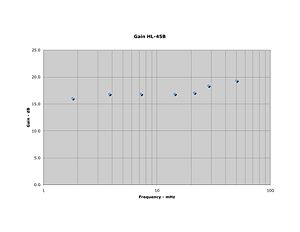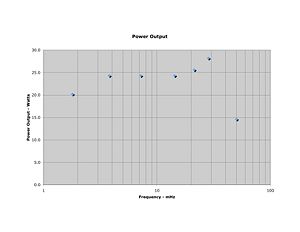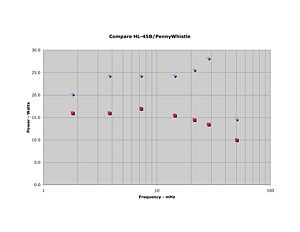Difference between revisions of "The Tokyo Hy-Power HL-45B Solution"
From HPSDRwiki
(→The Direct Connection Option) |
m (→The Direct Connection Option) |
||
| Line 3: | Line 3: | ||
Specifications and other information on the Tokyo Hy-Power labs' HL-45B is available at [http://www.thp.co.jp/english/hl_45b_e.html Tokyo Hy-Power's web site]. The measured Gain of this amplifier is shown in Figure #1. [[Image:0001ii.jpg|thumb|300px|Figure #1. The measured gain of the HL-45B HF/6 Meter Amplifier]] | Specifications and other information on the Tokyo Hy-Power labs' HL-45B is available at [http://www.thp.co.jp/english/hl_45b_e.html Tokyo Hy-Power's web site]. The measured Gain of this amplifier is shown in Figure #1. [[Image:0001ii.jpg|thumb|300px|Figure #1. The measured gain of the HL-45B HF/6 Meter Amplifier]] | ||
Phil Crosno, N6AS, did the initial work on the selection of this amplifier to provide additional power output for a HPSDR rig. His power output of a directly connected HL-45B to a Penelope/Mercury based transceiver is shown in Figure #2. Comparison of the HL-45B to the power output of the PenneyWhistle is shown in Figure #3 (using Penelope as the driver at 13.6 Volts in both cases).[[Image:0001gz.jpg|thumb|300px|Figure #2. The measured power output of the HL-45B HF/6 Meter Amplifier at 13.6 Volts]] | Phil Crosno, N6AS, did the initial work on the selection of this amplifier to provide additional power output for a HPSDR rig. His power output of a directly connected HL-45B to a Penelope/Mercury based transceiver is shown in Figure #2. Comparison of the HL-45B to the power output of the PenneyWhistle is shown in Figure #3 (using Penelope as the driver at 13.6 Volts in both cases).[[Image:0001gz.jpg|thumb|300px|Figure #2. The measured power output of the HL-45B HF/6 Meter Amplifier at 13.6 Volts]] | ||
| − | [[Image: | + | [[Image:0001vl.jpg|thumb|300px|Figure #3. A comparison of the HL-45B HF/6 Meter Amplifier power output to the PenneyWhistle power output when both are operated at 13.6 Volts]] |


